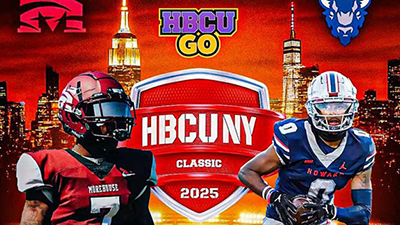By Shaun White
(Source: HBCU News)
In the 2025 season, Curtis Symonds and his team at HBCU GO are making notable advancements to transform the platform into a leader for Black college sports broadcasting.
“The conferences are starting to do new deals with ESPN,” Symonds reflected in his annual chat with HBCU Legends. “We’re no longer so much the ‘second fiddle’ as we started in the beginning of this game, and that started to open up doors where a lot of these classics have now seen what we’re doing.”
HBCU Legends first reported the 10-year, $120 million deal HBCU GO agreed to with the Southwestern Athletic Conference in 2022. Symonds, as President of HBCU GO, has been relentlessly expanding both the company’s reach and reputation.
Since locking down 10-year deals with major HBCU conferences like the SWAC, SIAC, and CIAA, Symonds acknowledged, “We’re still working on the MEAC.”

HBCU GO will enter its fourth season of producing black college sports content and will feature several cherished classics:
“I think this year will be a kickoff to our best year in our schedule,” Symonds said. 2025 begins with Hampton visiting Jackson State in a Week 1 clash that has the network quietly rewriting the rules.
Notably, Symonds is proud of the network’s accessibility. “We’re not behind a paywall. We’re free. And it’s starting to get more conversation for more people,” he shared. With syndication now reaching 95% of television households and about 90% of Black households, HBCU GO isn’t just broadcasting games; it’s delivering cultural moments to living rooms nationwide.
Symonds highlighted the inaugural Las Vegas Classic, which has immediately become a highly anticipated showcase between the reigning HBCU Football National Champions from Jackson State and the storied Grambling State program.
The fan bases are buzzing with excitement for the Oct. 25th match at Allegiant Stadium in Las Vegas.
The Gulf Coast Challenge between Jackson State and Alabama A&M also promises drama as new coach Sam Shade (AAMU) will take center stage versus SWAC Coach of the Year TC Taylor (JSU).
The Morehouse and Howard showdown at MetLife Stadium puts HBCU sports on a massive stage in the Big Apple. Symonds emphasized that turning these games into national TV events will inject energy and opportunity into the entire HBCU sports ecosystem.

Another major acquisition was to broadcast the first matchup between former NFL stars-turned-HBCU coaches, DeSean Jackson (Delaware State) and Michael Vick (Norfolk State), at Lincoln Financial Field on Oct. 30th.
Yet, as Symonds keenly observed, the media landscape is undergoing a shift. The recent political climate, particularly the rise of attacks on diversity, equity, and inclusion (DEI), has led to funding cuts and wariness from advertisers.
“The landscape has definitely changed,” he said. With pressures on government grants and sponsorship dollars, HBCU GO is forced to innovate — leveraging the buying power and campus presence of Gen Z to attract brands in new ways.
Still, Symonds remains optimistic, finding opportunity in adversity. He points to the enduring popularity of live sports, growing industry accolades for production quality (including five Telly Awards in just three years), and the power of being part of Byron Allen’s black-owned media empire.
“We’re niche. No one’s really doing anything in this circle… we’re making good strides when people are paying attention to us, and we’re going against that caliber of people.”
A cornerstone of HBCU GO’s mission is talent development — both in front of and behind the camera. Echoing the BET tradition of nurturing future stars, Symonds takes pride when bigger networks court his broadcasters: “If ESPN comes and grabs them, it shows me I’ve done my job. Somebody’s watching.”
This extends to student engagement. HBCU GO brings student volunteers into production whenever they are on campus, with a focus on increasing the amount of student-created content on air.
Whether it’s Morehouse students shooting Emmy-nominated documentaries or Southern University’s band video team winning awards, Symonds believes “the goal was to try to have the university begin to start creating content for the network.”
By opening doors for students, HBCU GO not only tells the stories but cultivates the storytellers themselves.
Despite broadcasting to millions, Symonds is keenly aware that in-stadium energy is crucial for both the TV atmosphere and campus spirit. He’s troubled by the contrast with predominantly white institutions (PWIs), where students fill stadiums in droves.
“One of my major pushes this year is to try to get a way in which we can figure out some kind of creative way…to help drive Gen Z’s into the stadium to watch the game.” He’s exploring everything from incentive-laden partnerships with advertisers to creative in-game initiatives.
Ultimately, Symonds views HBCU Go as both a window and a lifeline for student-athletes, students, teams, and conferences.
“Sports will never go away. Sports is just what we all live and grew up on, you know, so it it’s always going to be an attractive bug out there in the street.”
As HBCU Go’s reach grows and its mission deepens, Symonds and his team are not just changing how HBCU sports are broadcast — they’re empowering communities, providing opportunities, and ensuring that the HBCU sports stories are broadcast across the nation for all to enjoy.

